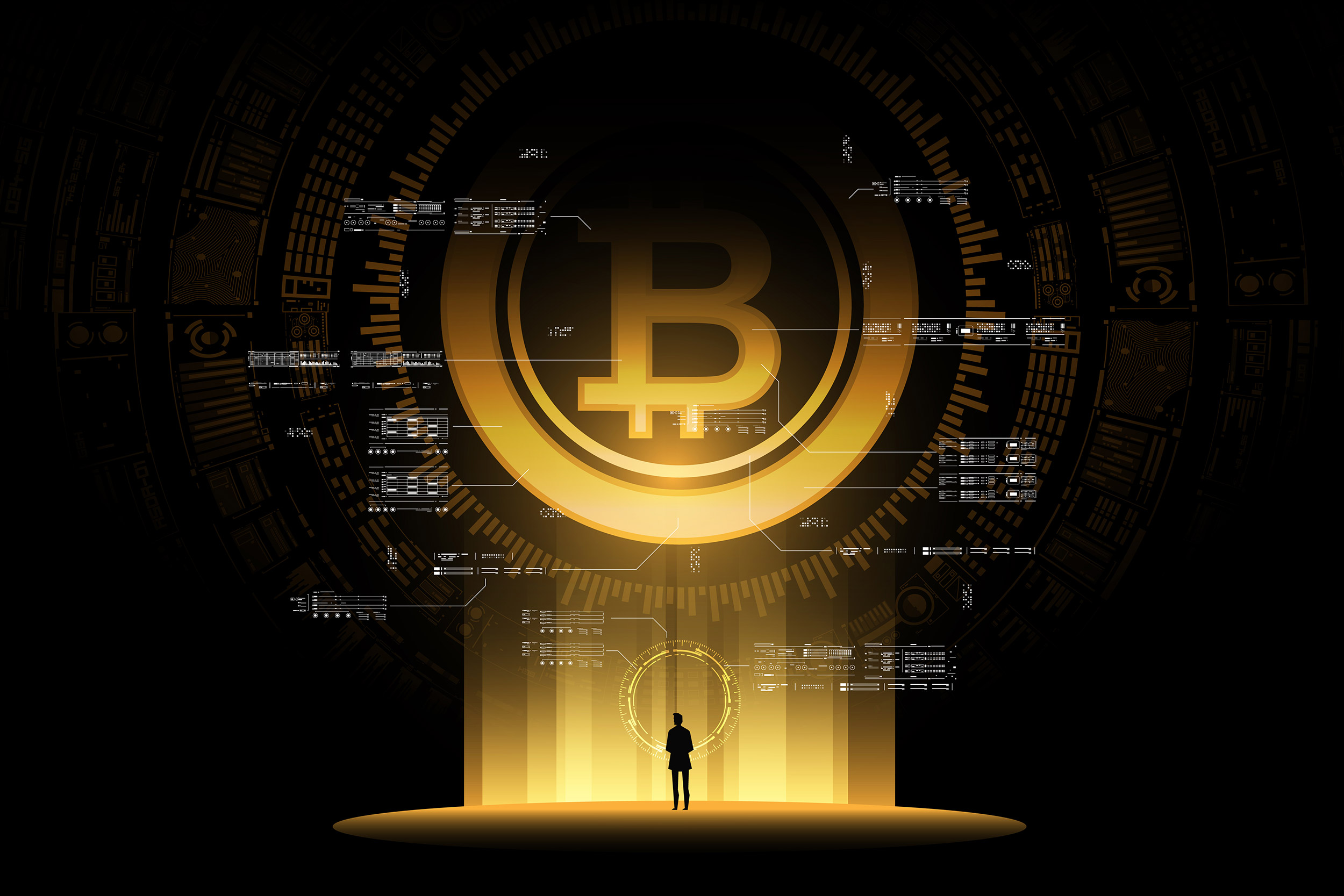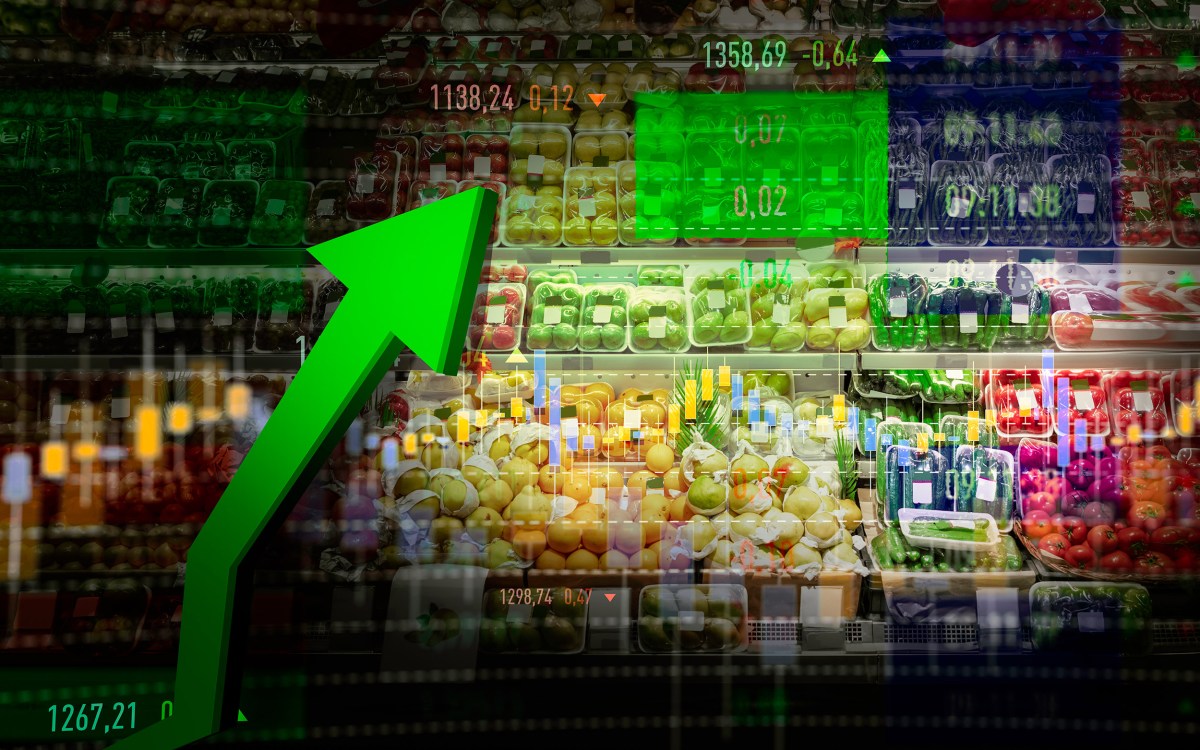
Illustration by Hiro Hideki/iStock
Taking the crypto out of digital currency
Berkman Klein’s De Filippi discusses recent gyrations
Swings in the value of cryptocurrencies like Bitcoin in recent weeks have turned the media spotlight on digital money and left investors who were giddy from this winter’s rapid gains downcast as values came back to earth. Bitcoin, trading around $10,000 during the late summer and into the fall, reached a peak over $63,000 in April before losing nearly half its value in recent weeks.
For the uninitiated, cryptocurrencies are digital money that derive their name from the fact that encryption is used to keep them secure. They make use of blockchain technology, a massive, decentralized network of computers that keeps track of transactions. The currencies can be used to buy goods and services (although their acceptance is not widespread). They are, perhaps, best known as investment vehicles, with owners buying and selling as a currency’s value rises and falls. Individuals can get cryptocurrency by buying it or, in the cases of some, like Bitcoin, by mining it — miners use powerful computers to compete to win currency by being the first to solve complex math problems that verify transactions.
The potential volatility of digital money has recently been in the news as Bitcoin seemed particularly vulnerable to public comments by Tesla founder Elon Musk, raising questions about its stability. (In fact, Musk’s jokingly dismissive comments on “Saturday Night Live” sent cryptocurrency Dogecoin plummeting, as he had been viewed as an influential supporter of digital money.) To sort out what’s going on, the Gazette spoke with Primavera De Filippi, a faculty associate at the Berkman Klein Center for Internet and Society and coauthor of the 2018 book “Blockchain and the Law: The Rule of Code.” De Filippi said despite its apparent instability, cryptocurrency is here to stay, though it perhaps shouldn’t be the first coin you reach for to buy a pack of gum.
Q&A
Primavera De Filippi
GAZETTE: I think most of our readers have heard about cryptocurrency and Bitcoin, but they may be wondering what makes Bitcoin — and cryptocurrencies generally — preferable to regular currency like the dollar?
DE FILIPPI: There are two main reasons. The first is that there is no inflation. In fact, oftentimes cryptocurrencies have deflationary dynamics because people can lose their private key [a secure password] and, once the private key is lost, you can never access those cryptocurrencies. On the other hand, you never know when the government will decide to print more currency and create inflationary dynamics. With cryptocurrency, the [overall] amount that will be created is algorithmically programmed so no one can create more. The other reason is the possibility to control your own funds. If you have cash, you can control your own funds, but that’s about it. As soon as you start using a bank account, credit cards, PayPal, whatever, you depend on an intermediate operator who at any time can choose whether or not you can spend your money, or potentially even lose your money.
Increasingly though, people using cryptocurrency are also relying on intermediaries. That’s because, in the same way that you don’t want to store all your cash in your house for fear that someone might steal it, it’s quite complex to secure your digital infrastructure. And, if you have a lot of money in Bitcoin, you want to be very careful about how you secure your private key because anyone who gets access to your private key will be able to spend your money. So people often rely on an intermediary so they don’t have to deal with security. But there is this possibility — which doesn’t exist with traditional fiat currency — that I can choose to be the sole controller of my funds.
GAZETTE: Are there savings potentially in there as well, in that you’re cutting out the credit card companies and bank fees and that kind of thing?
DE FILIPPI: That was the premise early on. There was a discussion about the fees that we pay to banks and being able to make microtransactions with no fees. Unfortunately, that’s no longer the case because in the popular cryptocurrencies, like Bitcoin and Ethereum, it’s extremely costly — last week, it was about $200 to send funds — so microtransactions do not make sense anymore. Now only large transactions make sense, and fees are actually increasing because the networks are becoming saturated, and too many people want to do transactions. This creates competition, and if you want your transaction to be processed before others, then you have to pay higher transaction fees. So, if it’s a small blockchain — not that popular and therefore not saturated — transactions are extremely cheap, but the most popular ones like Bitcoin are very expensive.
GAZETTE: One criticism of the currency is its environmental impact. How can a cryptocurrency require so much computing power that there’s more than just a background increase in environmental impact?
DE FILIPPI: This is because of the mining protocol. The mining protocol is designed to make sure that the higher the value of the cryptocurrency, the more secure the system will be. Mathematically, it’s extremely elegant, but the problem is that in practice, it has terrible consequences.
I’m going to use the example of Bitcoin, but many other blockchains use a similar system. The idea is that every 10 minutes, a “block” [a group of transactions] is generated along with a particular amount of Bitcoin. In order to create a block (which increases security), you need to find the solution to a mathematical problem. People try to solve the problem because they want to retrieve the mining reward, which is the new Bitcoins that are generated with every block. That’s mining. The difficulty of the problem depends on the speed at which the network finds a solution, and the goal is that every 10 minutes someone finds the solution, on average. If there are very few people in the network, the problem is easy; otherwise it will take too long to find a solution. If more people are trying to find a solution, the difficulty will have to increase.
There is a trade-off with how expensive it is to mine. That’s because the difficulty will determine the amount of energy consumed in order to find the solution to this problem. So, as the price of Bitcoin increases, more people join the mining game because they will gain more by finding the block than they will spend on electricity to find it. But as more people join because of the arbitrage opportunity, if the solution is found too fast, then the difficulty increases and then some people will drop out because now it’s not affordable anymore. So there is this load balancing that happens: As the network grows, the difficulty increases; but the network grows because the value of the cryptocurrency grows. So when it falls — Bitcoin went from $60,000 to $30,000 in the last two weeks — a lot of miners stop, because their cost of the electricity is higher. That means the difficulty of the problem decreases. Because it decreased, more people will come, maintaining this equilibrium between energy consumption and the value of the cryptocurrency.
“There’s been way too much institutional buy-in to call it a gimmick. It might have been a gimmick up to maybe 2012‒2013, but I think it’s here to stay.”
GAZETTE: So, at its root, it comes down to security?
DE FILIPPI: It’s enshrined in the need to ensure security. But now, because people have become aware of the ecological impact, they are coming up with alternative consensus protocols that will provide at least the same level of security without requiring all this energy consumption.
GAZETTE: What is cryptocurrency’s usefulness to actually buy things, versus its function as an investment vehicle for people looking to profit from its price swings?
DE FILIPPI: I would say one of the only ways that Bitcoin is being used is to send Bitcoin — you need to spend some Bitcoin in order to send some Bitcoin, on transaction fees to buy other cryptocurrencies on the cryptocurrency exchanges. That’s because when you see something going from less than $10,000 to almost $70,000 in less than a year, you don’t want to buy something with it knowing that in a few days, you might have bought twice as much. And, if I need to pay $200 for any transaction, I’m never going to use Bitcoin unless I need to buy something very, very expensive. There are three functions of money, a unit of account, a store of value, and a means of payment, and right now Bitcoin is pretty much mostly a store of value.
GAZETTE: What’s your broad assessment of this? Are these the growing pains of something that’s here to stay and still perhaps the future of money? Or is it evidence that cryptocurrency is a gimmick?
DE FILIPPI: There’s been way too much institutional buy-in to call it a gimmick. It might have been a gimmick up to maybe 2012‒2013, but I think it’s here to stay. Probably it’s here to stay more as a financial asset than as an actual means of payment, but that means it’s like gold. Gold is not something you use in order to buy stuff. It’s a store of value, and it’s here to stay.
The ecosystem of blockchain technologies is emerging and developing, so there are things like Bitcoin that are pretty much designed to be digital gold. And then you have a lot of other cryptocurrencies that are slightly different, which actually could be used for different things and different clients, as we see today with Ethereum and the NFT’s, non-fungible tokens, which are becoming very popular as a way to ensure digital scarcity. That’s a very different use case, but very important as well. We are slowly starting to understand and explore the different uses of this technology. It will evolve in many ways that we cannot expect in the same way as the internet has evolved in many ways that we did not expect. But I think the technology is definitely here to stay.
Primavera De Filippi is a faculty associate at the Berkman Klein Center for Internet and Society.
Photo courtesy of Primavera De Filippi

GAZETTE: In the last few weeks, we’ve had prices move based on statements by Elon Musk. What is your assessment of the recent volatility?
DE FILIPPI: We saw a similar situation in 2017 and ’18. It went from like $500 to — I forgot how high, like $10,000 or $20,000. And then I think it dropped again and then went back up after that. This happens when you have new people coming in, making prices go up. An experienced trader knows exactly when to sell, traditional pump-and-dump strategies. It’s easy to see how manipulatable this model is. It’s interesting that it came right after the GameStop saga, when we saw that Reddit can actually affect the stock market. You have a very visible individual like Elon Musk who can literally pump and dump. [Musk has denied widespread accusations that he promoted Bitcoin then sold some of his company Tesla’s currency for a profit earlier this year.] It’s not new; it has happened all the time; and it’s probably going to continue to happen.
There’s a distinction between this and the traditional stock market in that it is so easy to jump in, so easy for anyone who has no knowledge whatsoever to just start trading cryptocurrency. I saw recently that Coinbase’s app has more downloads than TikTok, which means it has become absolutely democratized in terms of adoption — though by people who don’t really know how to play the game, so they’re easily influenced. On the one hand, you have experienced traders and on the other hand, you have many inexperienced players.
GAZETTE: Do you see government regulation coming into the picture more?
DE FILIPPI: I think definitely in the cryptocurrency exchanges, in terms of KYC [Know Your Customer standards intended to prevent money laundering and other illegal activities], and making sure that everyone is actually paying taxes on the profits that they make. In the U.S., a lot of the cryptocurrency exchanges are required to communicate to the IRS all the transactions being made by the users. Increasingly, all the cryptocurrency exchanges do not let users do anything unless they KYC themselves. So there is a strong push towards regulation.
It’s like IPOs [initial public offerings] once were. Initially it was the Wild West and then slowly regulation came in. The SEC [Securities and Exchange Commission] started to determine what should be regulated as a security and what not. In some ways, it’s necessary to provide some kind of legal certainty. Right now, not everyone is trying to abuse the system, but as long as there are ways to scam, some people will jump on that opportunity. The caveat is that it’s harder to regulate this technology. It’s easy to regulate intermediaries, who are playing a more and more important role over time, but it’s also possible to bypass the intermediaries and transact on a peer-to-peer basis, which is actually much harder to regulate.
Interview was edited for clarity and length.







